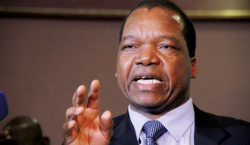



Muhammad Ali died on Friday night at a hospital in Phoenix, Arizona.
Boxing legend Muhammad Ali died of “septic shock due to unspecified natural causes”, his family has said.
The three-time world heavyweight champion – one of the world’s greatest sporting figures – died on Friday night at a hospital in Phoenix, Arizona.
The 74-year-old had been suffering from a respiratory illness, a condition that was complicated by Parkinson’s disease.
A public funeral will be held for the boxer on Friday in his hometown of Louisville in Kentucky.
“He was a citizen of the world and would want people from all walks of life to be able to attend his funeral,” said the family spokesman, Bob Gunnell.
Former US President Bill Clinton is among those who will give a eulogy at the service, and was one of many prominent global figures who paid tribute to Ali on Saturday, saying he lived a life “full of religious and political convictions that led him to make tough choices and live with the consequences”.
The legendary Brazilian footballer, Pele, said the sporting universe had suffered a huge loss.
“Muhammad Ali shook up the world. And the world is better for it,” said US President Barack Obama.
Hometown mourns the ‘Louisville Lip’
61 fights
over a professional career lasting 21 years
56 wins
including 37 knockouts
Ali was as much a campaigner for black equality as he was a champion in the ring, where he won 56 of his 61 fights.
Asked how he would like to be remembered, he once said: “As a man who never sold out his people. But if that’s too much, then just a good boxer.
“I won’t even mind if you don’t mention how pretty I was.”

“He was the greatest”
But he was once a polarising figure in the US. At a time of racial segregation in the 1960s he joined the separatist black sect, the Nation of Islam, which rejected the inclusive approach of civil rights leaders such as Martin Luther King.
George Foreman, who lost his world title to Ali in the famous “Rumble in the Jungle” fight in Kinshasa in 1974, called him one of the greatest human beings he had ever met.
“To put him as a boxer is an injustice,” said Foreman.
American civil rights campaigner Jesse Jackson said Ali had been willing to sacrifice the crown and money for his principles when in 1967 he refused to serve in the Vietnam war.
That decision was widely criticised by the boxer’s fellow Americans. He was stripped of his title and had to put his fighting career on hold for three years.
Born Cassius Marcellus Clay, Ali shot to fame by winning light-heavyweight gold at the 1960 Rome Olympics.
Known as “The Greatest” – a nickname characteristically coined by the boxer himself – he beat Sonny Liston in 1964 to win his first world title and became the first boxer to capture a world heavyweight title on three separate occasions.
World media: Muhammad Ali was unique
Nick Bryant: How Ali changed his sport and country
Foreman: “One of the greatest human beings”
At the time of his first fight with Liston, Clay was already involved with the Nation of Islam, a religious movement whose stated goals were to improve the spiritual, mental, social, and economic condition of African Americans in the US.
But in contrast to the inclusive approach favoured by civil rights leaders like Dr Martin Luther King, the Nation of Islam called for separate black development and was treated by suspicion by the American public.
Ali eventually converted to Islam, ditching what he called his “slave name” and becoming Cassius X and then Muhammad Ali.
Noted for his fast talk and bold fight predictions as much as his skills inside the ring, he retired in 1981 having won 56 of his 61 fights – 37 by knockout – and was later crowned “Sports Personality of the Century” by the BBC.
He was handed his first professional defeat by Joe Frazier in the “Fight of the Century” in New York on 8 March 1971, only to regain his title with an eighth-round knockout of George Foreman in the “Rumble in the Jungle” in Kinshasa, Zaire (now Democratic Republic of Congo) on 30 October 1974.
Ali fought Frazier for a third and final time in the Philippines on 1 October 1975, coming out on top in the “Thrilla in Manila” when Frazier failed to emerge for the 15th and final round.
Six defences of his title followed before Ali lost on points to Leon Spinks in February 1978, although he regained the world title by the end of the year.
His career ended with one-sided defeats by Larry Holmes in 1980 and Trevor Berbick in 1981, many thinking he should have retired long before.
Soon after retiring, rumours began to circulate about the state of his health. His speech had become slurred, he shuffled and he was often drowsy.
Parkinson’s syndrome was eventually diagnosed but Ali continued to make public appearances, receiving warm welcomes wherever he travelled.
He lit the Olympic cauldron at the 1996 Games in Atlanta and carried the Olympic flag at the opening ceremony for the 2012 Games in London. BBC